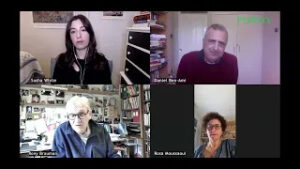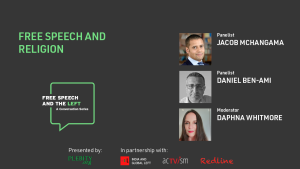A workshop for university instructors and graduate students raises questions
It is a fact that free speech is out of fashion. This is alarmingly true even at the highest levels of U.S. academia. Academia also happens to be where we are incubating the next generation of citizens and leaders. Unfortunately, it is also where the most foundational value, freedom of expression, so vitally important to any notion of a free society, is not being taught.
Recently, Oklahoma University contributed their own stark example of how the core values of free speech and critical thinking are being misunderstood and misapplied in the spheres of what we call ‘higher education’.
The University of Oklahoma recently held a workshop entitled “Anti-Racist Rhetoric and Pedagogies”. It was widely shared after being made public by Fire, an organization dedicated to protecting the individual rights of students and faculty members in U.S. academia.
The purpose of the workshop was to advise instructors and graduate students and to share tips on how to control and suppress unwanted speech in their classrooms. To be fair, these presenters make some good points. They emphasize that standard English should not be considered the only way or even an inherently better way to communicate. They want to be sure that their students are encouraged to write in their own vernacular(s) and to internalize that this is in no way less complex, interesting or valuable than communicating in standard English.
But they quickly move on to their central point about why they need to control and suppress certain speech and lines of inquiry in their classrooms and how to shut these down. They do try to define the problem by saying that this is “…not about rooting out any knd of resistance or difference” but rather “the thing that we’re rooting out is just if there’s any argument that tries to erase me or anyone else…” (44:28) And they try to minimize the significance of their position in insisting that they are not taking a “a political stance’ but rather that they are just talking about ‘ethics and respect”. (45:10)
One presenter tells participants that she explains two things to her students on the first day of class: that “they have to avoid making derogatory remarks, critiques and hate speech” or she will ‘call them out on it’ and that they need to ‘avoid white supremacist ideas or sources when they’re making their own arguments’. She adds that “..if it happens… continues to happen…report them”. (19:15)
They refer to a short essay by Ibram X. Kendi’ When Free Speech Becomes Unfree Speech‘ to justify their position. The presenter explains the premise which is that there is actually no such thing as free speech. She summarizes Kendi’s argument that someone is ‘always paying’ for what another person may consider exercising their free speech. The issue here is that the instructors have moved any critique of this premise off-limits. In one step they both state the source that justifies their position and at the same time they remove the very tool necessary to challenge it.
Should any of the participants of this workshop be worried about the idea of curbing their students’ free speech this instructor assures them that “in the classroom free speech does not apply. (20:08) We can tell our students… No you do not have the right to say that. Stop talking right now”. (20:05)
Later in the workshop an instructor says “I look for students who might be entertaining the idea of looking at a problematic argument…” She tries to steer them away by saying “I don’t know if you’re going to have an effective paper if this is what you’re going to take up” and finally, if the soft dissuasion isn’t enough, she says “we don’t have to listen to that.” (44:50)
Does the extremism of what is being passed off as a very matter of fact classroom policy worry any of the faculty members attending this workshop? A speaker explicitly addresses this: “One of the fears is that we’re going to get in trouble for this. Like, we can’t tell students that they can’t say something in class. But, we can! And let me tell you how.” (17:40)
The workshop concludes with some interesting questions from the attendees, including one about use of preferred pronouns that showed that even the instructors don’t agree on exactly what speech is unacceptable.
Let’s step back and ask the first and most obvious question. Who exactly is in a position to decide what speech is acceptable and what speech should be suppressed and punished? Even these workshop presenters don’t quite see eye to eye. Nonetheless, they are each claiming the power to make the decision as to what speech their students are allowed and what speech must be punished or forbidden.
The instructors leading this workshop seem to believe that they have landed on some area of incontestable truth not even worthy of critique. Yet their opinions about free expression are not shared by many, including some notable individuals from the past who arguably gave it far more thought than these teachers have.
Civil rights leader John Lewis explicitly does not claim this power to decide what speech should be suppressed when he said “Without robust freedom of speech and dissent, the civil rights movement would have been a bird without wings.”
Martin Luther King did not claim to have this power when he said this in his very last speech:
“If I lived in China or even Russia, or any totalitarian country, maybe I could understand some of these illegal injunctions. Maybe I could understand the denial of certain basic First Amendment privileges, because they hadn’t committed themselves to that over there. But somewhere I read of the freedom of assembly. Somewhere I read of the freedom of speech.“
But the faculty instructors at the University of Oklahoma do claim both the power and the wisdom to decide what is acceptable speech. They seem to believe they are in possession of truth and facts that were invisible to John Lewis and Martin Luther King.
Because certain figures and certain ideas go out of fashion does not make them less relevant or important to understanding the world today. You can decide that these civil rights leaders of some fifty years ago have no special insights into the world today. You can easily discard any lessons from history if you aren’t comfortable with them. The fact is that suppression of speech may make these teachers feel like they are virtuous, but we know that suppressing speech does not eliminate hateful ideas and can even make them worse. These faculty members at Oklahoma University seem to lack a sense of humility or knowledge of history. They could benefit from some history courses.
A reading of history might show them that restraints on free speech have worked against minorities and the powerless time and time again. Dominant social groups always try to suppress minority speech to enforce their own power. Minority rights are always dependent on rules allowing for, not suppressing, free speech.
One individual who has thought long and hard about the issue of free speech is former American Civil Liberties Union (ACLU) president, Nadine Strossen, who says:
One can’t forget that over time, in general, the powers that be are directly accountable to majoritarian interests or powerful business interests and are not going to be disposed to protect the speech of those who are members of minority groups and who are advocating minority causes.We can look at one country in particular—Germany—whose history is like a laboratory on how effective are measures to limit free speech. Recoiling from their own recent past, post-war Germany enacted laws that ban certain speech defined as ‘hate speech’. About these German hate speech laws, former ACLU head Strossen says “these laws are at best ineffective and at worst counterproductive.”For that reason, many minority group organizations throughout U.S. history have, to the best of my knowledge, all opposed censorship — including hate speech laws, even when those laws are allegedly designed to benefit their interests.
Leaders of the civil rights movement in the United States always opposed censorship and always supported free speech very vigorously.
Although they have removed Nazi symbols and literature from the public sphere and passed laws banning hate speech, this has in no way eliminated antisemitism in Germany.
France has laws against certain speech yet this doesn’t prevent the ideas they are trying to suppress from spreading widely and rapidly as we discussed here.
The important point is that while these questions as to who can decide what is acceptable speech and what speech should be forbidden may be difficult to answer, they are all political. The act of deciding these questions is always a political act in spite of these Oklahoma teachers trying to claim otherwise. They have a vision of themselves as above politics, as privileged vessels of pure objectivity and truth. They may not recognize it but they are part of a typical political process, fraught with all kinds of contention and struggle.
Dominant social groups always try to suppress minority speech to enforce their own power. Minority rights are always dependent on rules allowing for, not suppressing, free speech.
It is delusional to believe that there is one bias-free position from where one can see the timeless truth. Every social conflict carries some element of this sense of exceptionalism based around one’s own group or beliefs. It may be ethnic division, identity politics, or nation states at war but it always begins with one group convincing itself that it has truth on their side.
It is also true that in a healthy society ideas about difficult subjects evolve. This can and should be an organic process where all ideas are allowed to be held up to scrutiny, challenged and critiqued. To take one current example we can look at the debate over evolving views on gender ideology and what might be considered the ‘acceptable’ range of opinions.
This editorial in The Guardian illiustrates how ideas that might be out of favor one day can gradually come to be seen in a whole different light.
“Freedom of expression is a fundamental human right and a cornerstone of democracy, which cannot flourish unless citizens can articulate their opinions and ideas without fear of retaliation, censorship or sanction.”
No one has the right to tell us where our minds can or cannot go. When someone sets themselves up with the authority to impose their limits on our thoughts we are all poorer. The unrestricted right of anyone, let alone students of higher education, to think critically about what is passed off as accepted wisdom, is truly foundational to a free society.
Free speech and exchange of opinions, valuing critical thinking and allowing even the most cherished ideas to be challenged is our only protection from ideological, tribal or religious domination. Without commitment to protect the rights of expression for everyone, it will always be the powerful who decide what is acceptable and what should be suppressed.
The point isn’t that free speech ensures a free society, it is rather that a free society cannot exist without free speech.
See also:Links related to this University of Oklahoma workshop:
https://www.msn.com/en-us/news/us/university-of-oklahoma-employee-encourages-calling-out-students-who-listen-to-problematic-arguments/ar-AALpEES



